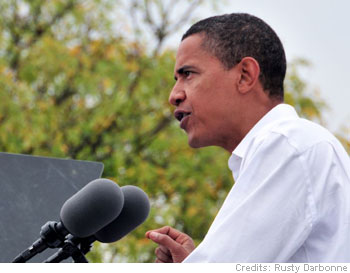 The post-mortems following the Massachusetts Senate by-election are coming in fast and furiously, but by far the most instructive remarks come from the President himself. He clearly doesn’t get it.
The post-mortems following the Massachusetts Senate by-election are coming in fast and furiously, but by far the most instructive remarks come from the President himself. He clearly doesn’t get it.
A majority of Obama voters who switched to Brown said that “Democratic policies were doing more to help Wall Street than Main Street.” A full 95 percent said the economy was important or very important when it came to deciding their vote. Surprise, surprise, policies do matter.
But what was the President’s reaction? ABC News reported,
President Obama said today that he feels he lost a direct connection to the American people in his first year in office because he focused too heavily on policy-making.
“If there’s one thing that I regret this year is that we were so busy just getting stuff done and dealing with the immediate crises that were in front of us that I think we lost some of that sense of speaking directly to the American people about what their core values are and why we have to make sure those institutions are matching up with those values,” Obama told ABC News’ George Stephanopoulos in an exclusive interview at the White House.
The arrogance and presumption of the statement is remarkable. Mr. President, the American people have core values, and they don’t encompass political cronyism and tolerance of fraud and corruption. And they go beyond mere reminders that “change takes time”.
Having persuaded himself that his powers of oratory can solve any problem (even minus the teleprompter?), the President patronizingly suggests that his “change” policies were not the problem, but that he failed in the presentation of them. It’s more likely that people were profoundly upset that with the “stuff” that the President and Congress were getting done, and his failure adequately to address the immediate crises that he faced in his first year in office.
When Obama continued the Bush/Paulson moves on the bank bailouts, that was the beginning of the end of his “change” Presidency. Health care was simply the confirmation as large proportion of his base was prepared to cut him slack waiting to see what he would do with the issue. In the end, we got a terrible bill, and no amount of salesmanship or nice speeches will change the substance. It does not even deliver on the promise that got most people prepared to hold their collective noses and vote for it, that of eliminating the practice of rescinding policies on the basis of “pre-existing condition”. Read the bill. As Yves Smith has highlighted, it allows an out for fraud. Guess what? Not telling your insurer of a preexisting condition, EVEN ONE YOU DID NOT KNOW ABOUT, is fraud! Unbeknownst to most, fraud is the means under current law that insurers deny coverage. The bill preserves the status quo here. A nursing organization with 150,000 members opposed the bill for this very reason.
We have major problems in this country: rising unemployment, a stagnating economy, overly expensive health care and a large group of uninsured, which adds to the costs of the latter. How is further enriching insurers and Big Pharma (which the bill does) going to solve the cost problem? Similarly, how has throwing ample financial subsidies at Wall Street, helped the average citizen on Main Street?
The President expended so much political capital and goodwill placating the likes of Jamie Dimon and Lloyd Blankfein. Now that they’ve got their government checks, they can do whatever they like and continue to poison the polity. The health insurance and pharmaceutical industries have followed the playbook, and used the political process the same way.
I am sure there are some people angered by too much government spending (aka, “socialism”) and others who are genuinely peeved that Obama is not spending enough. But more than that, there remains a profound sense of anger, mixed with helplessness amongst most people. The only means by which these people can manifest this anger (without resorting to riots and burning buildings) is via the ballot box. They will likely continue to take it out on people perceived to be the “ins”, the main feeders at the trough, versus the “outs”, who have got nothing, but the promise of a lot more economic misery. Massachusetts was the first significant political manifestation of this trend, and if his immediate comments are anything to go by, I doubt Obama will interpret the election result correctly, since his faux populism and reliance on “speaking directly to the American people” merely shows how contrived his Administration has become.
President Obama is providing increasingly disturbing parallels with one of Robert Redford’s memorable characters, Bill McKay, from “The Candidate”. If you recall how that movie ended, McKay escapes the victory party and pulls Lucas into a room while throngs of journalists clamor outside. McKay then asks his political spin doctor, Marvin Lucas, who engineered the victory: “Marvin … What do we do now?” The media throng arrives to drag them out at that moment and McKay never receives an answer. Today’s electorate is waiting for an answer from the President which encapsulates something beyond a mere “change” slogan. Judging from the policies, they’ve been getting, they aren’t happy with the answers.
- Bulenox: Get 45% to 91% OFF ... Use Discount Code: UNO
- Risk Our Money Not Yours | Get 50% to 90% OFF ... Use Discount Code: MMBVBKSM
Disclaimer: This page contains affiliate links. If you choose to make a purchase after clicking a link, we may receive a commission at no additional cost to you. Thank you for your support!



Leave a Reply